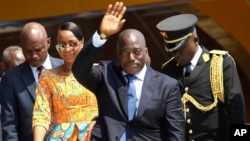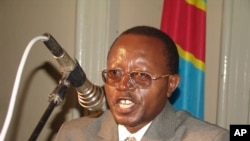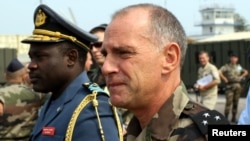Democratic Republic of Congo President Joseph Kabila has elevated a controversial former police chief, General John Numbi, to the rank of "national hero.”
Numbi, one of 17 Congolese officials targeted by U.S. and EU sanctions, is widely considered the principal suspect in the 2010 murder of a leading Congolese rights activist.
The Congolese human rights group Voice of the Voiceless expressed outrage. The group believes General Numbi played a key role in the 2010 murder of the its founder, Floribert Chebeya.
Chebeya disappeared shortly after being summoned to a meeting with General Numbi, who was then the chief of police. Chebeya’s body was later found while his driver, Fidele Bazana, is still missing.
Numbi was suspended as Congo’s chief of police after Chebeya’s disappearance, but two years later a military court declined to examine his alleged role in the murder.
Outrage
Rostin Manketa, the current executive director of Voice of the Voiceless told VOA he was shocked and very disappointed to learn that Numbi has been made a national hero. He said Numbi is considered by all defenders of human rights, as well as the families of Chebeya and Bazana, to be the “number one suspect in their murders,” which Manketa described as “a targeted and planned state crime.”
Another leading rights group, the Congolese Association for Access to Justice, said it is “deeply concerned” by the president’s decision and urged an “independent, impartial and exhaustive investigation” into the allegations that continue to surround Numbi.
Government spokesman Lambert Mende defended Numbi’s elevation to "national hero" status, telling VOA Numbi has not been charged with any crime and has only been accused of wrongdoing by private individuals and organizations.
But Numbi is also one of 16 senior Congolese officials that the United States and the European Union have hit with targeted sanctions since last September for their roles in violating human rights and undermining the electoral process.
The United States and EU claim that Numbi remains an influential adviser to the president despite having no official function and that he led a campaign of “violent intimidation” to get pro-Kabila provincial governors elected last year. Numbi has not responded publicly to the allegations behind the sanctions.
Defiance
Manketa says honoring Numbi is further evidence the Kabila administration intends to defy international pressure. He added that Numbi’s elevation as a “national hero” proves the Congolese state is not prepared to take into account all the allegations made about the general, both nationally and internationally.
The targeted sanctions include asset freezes and travel bans within the United States and EU.
Donatella Rostagno, director of the European Network for Central Africa, a coalition of European civil society groups, believes the measures will have a dissuasive impact on other senior Congolese officials.
“They still have bank accounts. Their families live in Europe. They come to Europe to get medical treatment … They have a life, most of them, in Europe … These sanctions mean that these people will be forbidden to travel here and to have that kind of life that they used to have. It will impact their daily lives.”
Polls were supposed to be held last November but were postponed and no new date has been fixed.
The government has not yet formally responded to the latest raft of sanctions against nine government officials and military chiefs, which were announced in the past two weeks. But last month in an interview with German magazine Der Spiegel, Kabila described the measures as actions that “perpetuate … neo-colonialism.”






